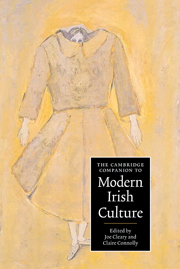1 - Introduction: Ireland and modernity
Published online by Cambridge University Press: 28 May 2006
Summary
The aim of this Companion is to introduce readers to modern Irish culture in all its complexity and variety. Before moving into detailed cultural analysis, however, the opening chapter invites readers to consider the historical and theoretical meanings of our framing concept: modern Ireland. What does modernity mean for Ireland? How can we conceptualise the modern culture of a country and a people with two languages, divided since the early twentieth century into two states? Officially incorporated into the United Kingdom with the Act of Union in 1800, Ireland in the nineteenth century was a constituent element of a sprawling empire of global reach. Union with Britain survives into the twenty-first century in the shape of the political border dividing Northern Ireland from the Republic. And yet the long history of Irish migration and diaspora means that even the divided island - the basic geopolitical unit - cannot be taken for granted as the sole sphere of modern Irish culture.
The nowadays much-debated terms terms ‘modern’ or ‘modernity’ also require consideration. For a long time, these words were associated with the radical intellectual iconoclasm of the Enlightenment and with the transformational dynamism of capitalism. The revolutionary utopianism of feminism, socialism and communism sprang from such quintessentially Enlightenment beliefs as human rights and global justice and equality: all such claims expressed in terms of a cry for the optimal extension of the modern. At the start of the new millennium, however, calls for the extension of modernisation are more likely to hinder than to abet campaigns for social justice or the dream of a better world beyond capitalism.
- Type
- Chapter
- Information
- The Cambridge Companion to Modern Irish Culture , pp. 1 - 22Publisher: Cambridge University PressPrint publication year: 2005
- 3
- Cited by



